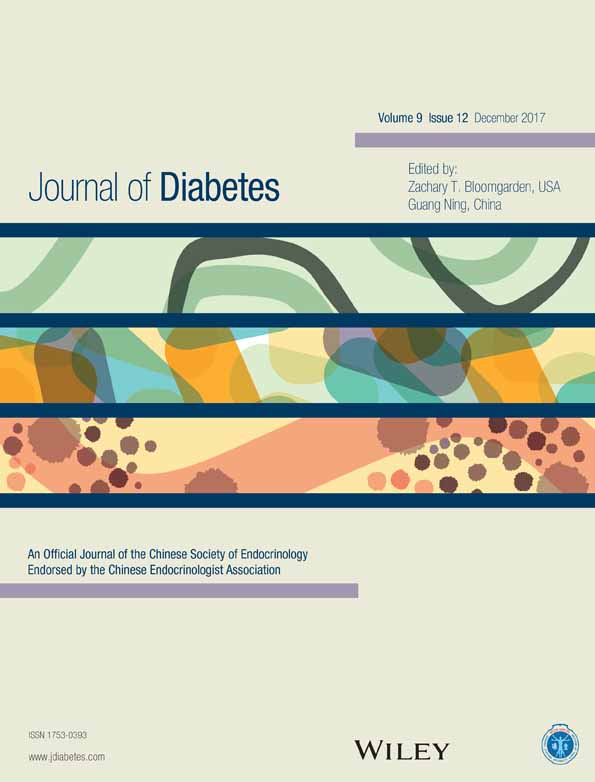Effects of dipeptidyl peptidase-4 inhibitors in type 2 diabetes patients with moderate to severe chronic kidney disease: Meta-analysis of randomized controlled trials using unadjusted data
DPP-4抑制剂在2型糖尿病伴中至重度慢性肾脏病患者中的作用:利用随机对照研究中未校正数据的meta分析
Abstract
enBackground
Three meta-analyses recently evaluated the effects of dipeptidyl peptidase (DPP)-4 inhibitors in type 2 diabetes (T2D) patients with chronic kidney disease (CKD). However, the combination of adjusted and unadjusted data in these meta-analyses may be questionable. The present study performed a meta-analysis of the effects of DPP-4 inhibitors in T2D patients with moderate to severe CKD using unadjusted data from randomized controlled trials (RCTs).
Methods
The PubMed, Embase (via Ovid), and Cochrane Central databases were searched for papers regarding the effects of DPP-4 inhibitors in CKD patients published before 1 August 2016. Data were independently extracted by two authors. A pooled analysis of unadjusted data was performed using random-effects models.
Results
Twelve studies representing 10 RCTs were included in the present analysis. Comparing mean HbA1c change between placebo and treatment, DPP-4 inhibitors significantly improved HbA1c levels at 12 weeks (mean difference [MD] –0.42; 95% confidence interval [CI] –0.54, −0.29), but improvements in HbA1c were seen only in dialysis patients at 24 weeks (MD –0.52; 95% CI –0.72, –0.32)*. Improvements in HbA1c were equivalent between DPP-4 inhibitors and sulfonylureas at 52 or 54 weeks. There were no significant differences in the incidence of severe or any hypoglycemic events between DPP-4 inhibitors and control (placebo or sulfonylureas) at 12, 24, and 52 or 54 weeks. However, DPP-4 inhibitors induced fewer symptomatic hypoglycemic events compared with sulfonylureas at 52 or 54 weeks. *[Correction added on 30 October 2017, after first online publication: The value ‘0.32’ has been corrected to ‘−0.32’.]
Conclusions
The present analysis shows that DPP-4 inhibitors are effective and comparable with sulfonylureas in T2D patients with moderate to severe CKD.
摘要
zh背景
最近3项meta分析评估了DPP-4抑制剂在2型糖尿病伴慢性肾脏病(chronic kidney disease,CKD)患者中的作用。但这些meta分析中将校正数据与未校正数据合并使用,可能是不合适的。本研究利用随机对照研究(RCTs)中的未校正数据,对DPP-4抑制剂在2型糖尿病伴中至重度CKD患者中的作用进行meta分析。
方法
检索PubMed、Embase(via Ovid)以及Cochrane Central数据库中2016年8月1日前发表的关于DPP-4抑制剂在CKD中作用的文献。分别由两位作者独立提取数据。使用随机效应模型对未校正数据进行合并分析。
结果
本研究中纳入了代表10项RCTs的12项研究。将治疗组和安慰剂组的HbA1c平均改变值进行比较,发现与安慰剂相比,DPP-4抑制剂在12周时显著改善HbA1c水平(平均差[MD] -0.42;95%可信区间 [CI] -0.54,-0.29),但在24周时仅在透析患者中观察到HbA1c 水平改善(MD -0.52;95% CI -0.72,-0.32*)。在52或54周时,DPP-4抑制剂与磺脲类药物在改善HbA1c 水平方面作用相当。在12周、24周、52或54周,DPP-4抑制剂与对照组(安慰剂或者磺脲类药物)在严重或者任何低血糖事件发生率方面没有显著性差异。但在52或54周,与磺脲类药物相比,DPP-4抑制剂更少引起症状性低血糖事件。[*在首次在线出版后,于2017年10月30日进行了如下校正:将“0.32”更改为“−0.32”。]
结论
本研究提示DPP-4抑制剂在2型糖尿病伴中至重度CKD患者中是有效的,其作用与磺脲类药物相当。




